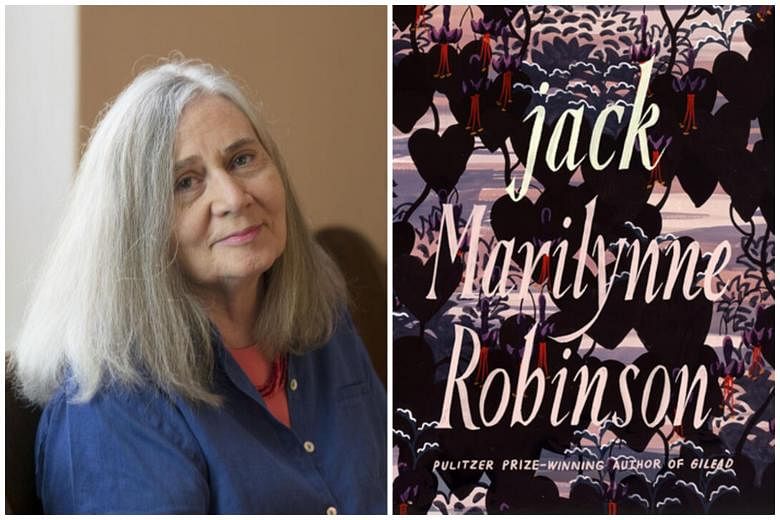FICTION
JACK
By Marilynne Robinson
Farrar, Straus and Giroux/Paperback/309 pages/$24.95/Available here
3 out of 5
In the fourth book of her Gilead series, Robinson - a Pulitzer Prize-winning American author - returns to focus on one of her most mysterious and complex characters - John Ames Boughton.
Better known as Jack, the wayward and favourite child of Reverend Robert Boughton, Jack is the archetypal prodigal son.
A problem child from the beginning, he almost killed his mother during his breech birth. Despite the endless love of his large family and the moral education provided by his father, Jack displays an incomprehensible need to steal, break and get into trouble. He is a drunk and a cad and it is no surprise that he ends up in jail.
It would be hard to have sympathy for Jack, except that he is so charming and painfully aware of his faults. He is well-read, recites poetry and is a good dancer and a pianist. For all his failings, he mostly means well. If not good, he aspires, he says many times over in this novel, to be harmless.
It is an endeavour he fails at repeatedly despite his best efforts, and no one is more confounded or disappointed by his inability to live a decent, harmless life than himself and, of course, his father.
In Home, the second book of the series, Jack appears on his dying father's doorstep after a 20-year absence, during which time he did not communicate once with his family or even attend his mother's funeral.
In his final weeks, Reverend Boughton tries to reconcile his Presbyterian beliefs - that souls are preordained for salvation or saved by the grace of faith - and his love for his morally and spiritually deficient son.
In the novel Jack, Robinson continues to tease out this theological argument about the redeeming of delinquent souls by plumbing the events of Jack's lost years.
Jack is the only book in the series which does not take place in the small, bucolic town of Gilead, Iowa. Instead, 1940s St Louis, Missouri is the stage.
The novel centres on Jack's star-crossed relationship with Della, whom he rescues from the rain with a stolen umbrella when he is newly out of prison. She mistakes him for a pastor and invites him to tea. They discover a shared passion for poetry and quickly fall in love.
Della is a high school teacher and a preacher's daughter, whereas to the outside world, Jack is a ne'er-do-well who cannot hold a job.
If this were not enough of an ill-fated match, he is white and she is black. In Jim Crow-era America, their relationship is illegal.
Despite her family's interventions and his attempts to do the honourable thing and leave her alone, they cannot seem to do without each other.
As a Methodist, Della believes Jack's soul can be redeemed. She says: "Once in a lifetime, maybe, you look at a stranger and you see a soul, a glorious presence out of place in the world. And if you love God, every choice is made for you. There is no turning away. You've seen the mystery - you've seen what life is about. What it's for."
Theological and philosophical theses such as this are the riverbeds along which Robinson's novels run. Typically, the morality tales are elevated by spellbinding depictions of landscape, familial interaction and domesticity which breathe magic into the mundane.
Unfortunately, perhaps because of the urban setting or because Jack and Della's story is mired in the dark muck of racism, these moments of poetic levity are lacking.
Robinson's Gilead novels are slow-paced narratives. She spends a lot of time setting the scene and not much happens in the first 150 pages, but her poetic facility with language often entreats the reader to slow down and savour the words anyway. Not so in Jack, where its narrator's tortured existence is difficult, if not sometimes painful, to bear witness to.
Ultimately, it succeeds in providing a fuller picture of one of Robinson's most controversial characters and the embodiment of a troubled soul. Credit must be given for her willingness to challenge her readers with these solemn, theological questions.
Can Jack's soul be redeemed? By the end, it is clear that the answer depends on the faith of the reader.
If you like this, read: Jayber Crow by Wendell Berry (Counterpoint, 2001, $28.19, available here). Jayber is an orphan and pre-ministerial student who has returned home to assess his lot in life through the lens of the land, the people who work it and his faith. It is the first of a series of novels by Berry, an American farmer, environmental activist, philosopher and poet who illuminates man's connection to the earth like few writers to date.

